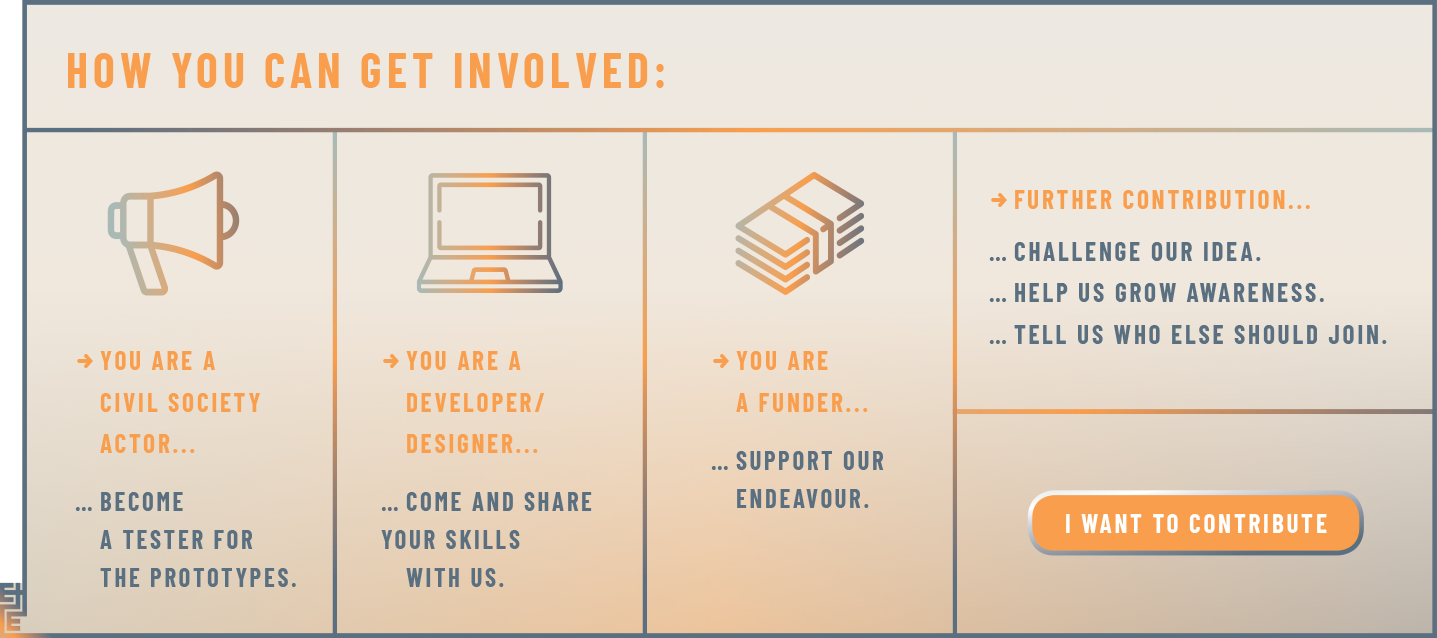The story so far
2020 - BERLIN - Meetup
“We are living in a moment of shrinking spaces but we are also living in moments in which resistance is organising itself and progressive forces are reorganising and acting.” This proclamation by Professor Donatella Della Porta captured the spirit of why more than 250 actors working with civil society and civic tech from around Europe met on a brisk Monday evening in Berlin. Gathered at the European Hub for Civic Engagement’s ‘Open Spaces! How Tech Can Empower Civil Society’, they discussed the importance of networks, solidarity, and sustainability, when working on strengthening European civil society with tech. The visual highlight of the evening was the European Hub for Civic Engagement’s presentation of four digital prototypes that address building community, turning ideas into impactful projects, making funding more accessible, and providing resources by matching civic actors across Europe.
2019 - TALLINN - Hackathon
In October 2019, the European Hub for Civic Engagement (EHCE) hosted a hackathon in Tallinn. The participants included civil society representatives, programmers, and designers. This diverse mix of professionals were able to come up with four prototypes for the EHCE’s digital platform, which will be presented at the EHCE’s Agenda Setting Conference in Berlin, 13 January 2020. The hackathon took place over two and a half days and was facilitated by the EHCE’s partner DATA4CHANGE. In the report that follows, the EHCE is happy to present the civic tech actor’s work from the hackathon.
Many issues for the European civil society were identified through the discussions between our participants in Lisbon and Gdansk, as well as by the commissioned report written by the strategic research center Pollytix. These issues were then grouped into four main challenges:
COMMUNITY – RESOURCES – IDEAS – FUNDING
To help mold the challenges into a workable form for the hackathon participants, the EHCE created ‘user stories’; examples of how one of the four challenges could directly affect a civil society organisation. At the hackathon, four groups of civic tech actors (each group corresponding with one of the main challenges) developed prototypes based on the curated user stories.
2019 - GDANSK | LISBON - Kick-Off Workshops
In September 2019, the European Hub for Civic Engagement (EHCE) took its first steps. Das Progressive Zentrum hosted two workshops with an inspiring mix of 42 civil society representatives from 23 European countries, in Gdansk and Lisbon.
Using design thinking elements, the workshops were able to elaborate exactly which features an online platform should provide to further strengthen civic engagement and transnational collaboration. The EHCE has grown through a bottom-up approach by involving civil society actors in the development process, guaranteeing tailor-made solutions for the unique daily working challenges of civil society actors. The workshops also made visible why a network of civil society actors and its Civic-Tech community is an indispensable prerequisite for a collaborating European civil society in an integrated Europe.
The EHCE recognises that digital advances have the potential to interconnect individual civic engagement and thereby strengthen a common European civil society. However, this has proven to be a challenge: the workshop attendees pointed to the lack of efficient digital tools and of digital know-how as aspects that need improvement. Although digitalisation has the potential to empower, participants reported that due to budget restraints many organisations cannot afford the development of user-friendly tools with a thought through outreach. This report expands on the three main challenges civil society is currently facing in Europe and how the EHCE can build a digital platform to empower civil society actors.


